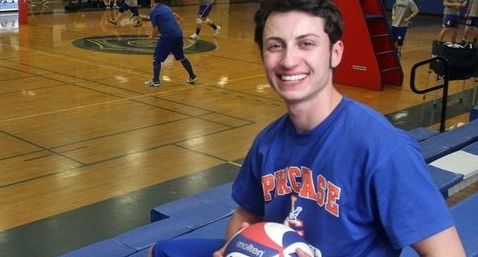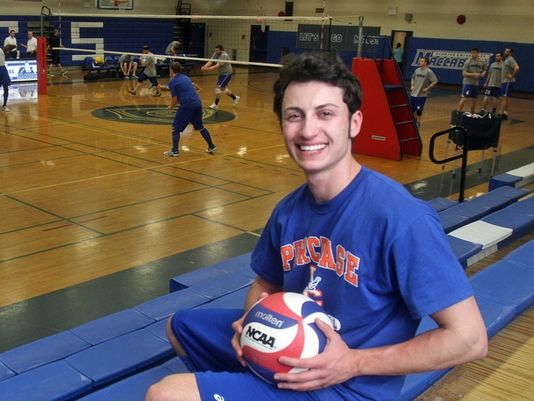Who is Taylor Edelmann?
He’s a 21-year-old Purchase College senior, a native of Bethel, Conn., and a captain of the men’s volleyball team. He’s a resident assistant, a club co-president and a research assistant. On the off chance he has a spare moment between practices, games and meetings, he’s a drummer in a jam band on campus.
And, he is formerly a she.
Born a female, Edelmann identifies as a male and has been undergoing a physical transition, via testosterone shots, for more than a year and a half. But Edelmann said that’s only a small part of what makes him the person he is.
“The thing is, I’m not different at all,” Edelmann said. “It’s just, I took a different course of action to get where other people are, and that’s totally fine. That’s kind of how I see it. It shouldn’t really be a big deal.”
Edelmann isn’t one to exaggerate. Trapped in the wrong body? No, more like aligning his body with how he felt.
“I just had to make a couple of alterations to it,” Edelmann said. “Basically, kind of like, change the tires, put a new paint job on, that kind of thing.”
That’s the type of child Debbie and Joe Edelmann raised. A competitive spirit was instilled in Taylor, the youngest of five children, at an early age — and it has stayed with him. To this day Debbie Edelmann believes that, if any of her other children went through what Taylor did, there would have been a much darker result.
“If this had happened to them, if they were born in the wrong body, I think there would have been a very different outcome,” she said. “Possibly drug addiction or alcoholism or suicide of some sort. Taylor is a very strong individual.”
Early indications
From an early age, Taylor Edelmann questioned his body. He remembers asking his mother, as a 4-year-old while taking a bath with his brothers, “Where’s mine?”
IN BASKETBALL: Transsexual returns to college court
“I literally thought that my mom had taken away my penis,” Edelmann said with a laugh.
As he grew older, Edelmann kept his feelings bottled up. He worried it might be a phase, just a youngster unsure of himself.
Puberty magnified the issue. While friends marveled at the idea of growing up, Edelmann panicked.
“All these changes are happening that you just can’t stop, that you have no control over,” Edelmann said. “You’d like them to go away. It reminds you that you are in your particular situation.”
It wasn’t until Edelmann’s freshman year of high school that he discovered he was not alone. After doing research online, he realized there were more than a million people nationwide dealing with similar circumstances. The National Center for Transgender Equality estimates 0.25% to 1% of the U.S. population is transgender or gender nonconforming.
“Reading different people’s stories, I was like, that aligns almost identically with how I feel,” Edelmann said. “Then I felt at ease. I’m pretty positive that’s how I feel.”
The signs were always there: how he related more to his brothers than his sister; his natural aggressiveness and intensity in everything he did; the protrusion in his neck, almost like an Adam’s apple, that he feigned embarrassment about but was secretly proud of. Even his own name, Taylor, was suited for both genders, as was his middle name, Ashley.
It all seemed to fit.
“It was almost like something in utero got messed up,” Edelmann said. “Something that was supposed to be.”
Outlet on the court
Edelmann chose to keep his feelings to himself, not wanting to be identified as “that trans kid” throughout high school.
Volleyball was Taylor’s outlet.
“It was something consistent every single day, that even if the day was awful and I felt uncomfortable, it was something I pretty much had complete control over,” he said. “I could kind of put all my stress into my body and getting better at the game.”
Edelmann, who earned all-state honors as a senior, had plenty of offers to play volleyball in college. One school stood out, though. A diverse campus and the opportunity to play volleyball made NCAA Division III Purchase College the perfect fit.
By the end of his first semester, Edelmann began explaining his situation to friends. He received nothing but support.
That’s not always the case. The National Center for Transgender Equality teamed with the National Gay Lesbian Task Force in February 2011 to conduct the largest national survey ever about transgender people. The survey showed that 78% of transgender/gender-nonconforming people experienced some form of harassment due to their gender identity or expression while in grades kindergarten through 12.
“Over the last several years, the experiences of many transgender people have been improving,” said Vincent Villano, director of communications for the National Center for Transgender Equality. “But harassment and violence are still very pervasive.”
When Edelmann discussed his situation with his parents that winter break, they were also accepting. For Debbie and Joe Edelmann, a choice made by their youngest child was not one made on a whim.
“If you knew this child from the time he was little, you would understand that Taylor always had a lot of thought in whatever goes on in his life,” Debbie Edelmann said. “No, I never thought for one moment when he made his decision on how he was going to be perceived that he’d change his mind.”
That’s why Taylor Edelmann chose not to begin any physical transformations, wanting to be sure of his decision before he made any changes that could not be reversed.
The decision put him in a gray area common among transgender people. Socially, he identified as a man, but physically, he was considered a woman. In society, certain establishments are black and white when it comes to gender. Places such as hospitals and jails are dangerous for transgender people, who fall somewhere in between.
And then there was volleyball. The sport that had served as his escape now made him feel out of place. While Edelmann excelled as a freshman on the women’s team, he had a nagging feeling he didn’t belong.
“I had fun playing (on the women’s team), but at the same time, I did feel like an outsider,” Edelmann said. “I felt like I was infiltrating a female space.”
A time of transition
In August 2011, Edelmann chose to take the next step in his transition. He began a regimen of testosterone shots.
“Immediately, it was kind of like a placebo effect,” Edelmann said. “The first time I did the injection, it was just like, I feel like I’m different, but I’m not. I was just euphoric because you’re finally starting something that you’ve wanted to do for such a long time.”
After six months, the changes were evident. Edelmann’s voice deepened. He grew facial hair. He lost fat in his thighs, chest and rear and gained it in his stomach.
That summer, Edelmann sent an email to then-Purchase women’s coach Bill Kutner to make him aware of his transition.
“My first thought was, ‘OK, how do I help him?’ ” Kutner said.
Kutner got in touch with Purchase athletics director Ernie Palmieri, who had just finished drafting a transgender policy for the school’s athletics department. Edelmann was the first to take advantage of the policy, which outlined how a transgender student-athlete could approach playing for a sports team consistent with the gender he or she identified with. The transgender policy was eventually adopted by the entire Skyline Conference, of which Purchase is a member.
“It was a concern of mine that there might be some problems,” said Palmieri, who is now Purchase’s vice president of student affairs, of Edelmann’s transition. “But there weren’t because everyone knew Taylor, so that was a good thing.”
In the winter of 2012, Edelmann joined the men’s volleyball team. He was welcomed with open arms.
“It’s not even that we were getting a really good volleyball player,” said teammate Jeremy Barton. “It’s that we were getting a really great person.”
Getting accustomed to the men’s game wasn’t easy for Edelmann. The faster pace took time to get used to. The ease with which Edelmann would register kills in the women’s game was no longer possible.
“It’s kind of like a little bit of an ego hit,” Edelmann said. “You’re so dominant in the one field you’re in, and now switching to the other side, you’re like, ‘OK, now I have to kind of step back and kind of revamp my whole image and my skills.’ ”
Edelmann hit the gym, packing on 30 pounds of muscle. Failure to reach his athletic potential because of his body was not an option.
After a solid junior season, he was voted a captain by the team.
Edelmann’s parents are appreciative of how their son has been accepted by the campus community. But they realize he probably won’t receive as much support elsewhere.
“I know Purchase is a wonderful school, and Taylor feels very comfortable there,” Debbie Edelmann said. “But I’ve always said to Taylor, ‘You are in a bubble at that school. That is not reality.’ ”
Moving forward
Edelmann will graduate this month with a bachelor’s degree in psychology. He will continue to get hormone injections. As for sexual reassignment surgery, he hopes to get a bilateral mastectomy, known as top surgery, at some point. Top surgery, which can run anywhere from $5,000 to more than $7,000, would remove his breasts and reshape his chest.
The procedure would allow Edelmann to change the gender on his birth certificate to male. Under Connecticut law, a person is required to have surgery to be able to alter his or her birth certificate.
For those who know Edelmann, there is no questioning who he is.
“I don’t like the term ‘trans’ — I never have,” Debbie Edelmann said. “Just because he doesn’t have a penis or he wasn’t born in a male body? No. Taylor is ‘he,’ and that’s the way it is. And other people? They’re the ones with the problem.”
Dan DeFrancesco also writes for The Journal News of Westchester County, N.Y.
Click here to read the original article.


